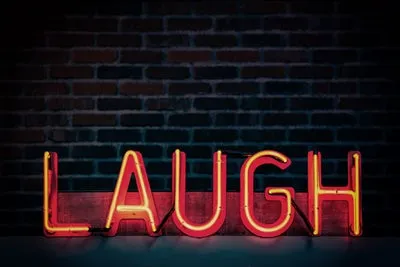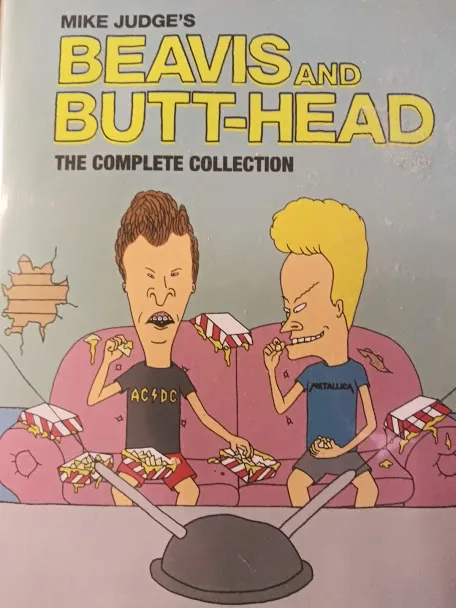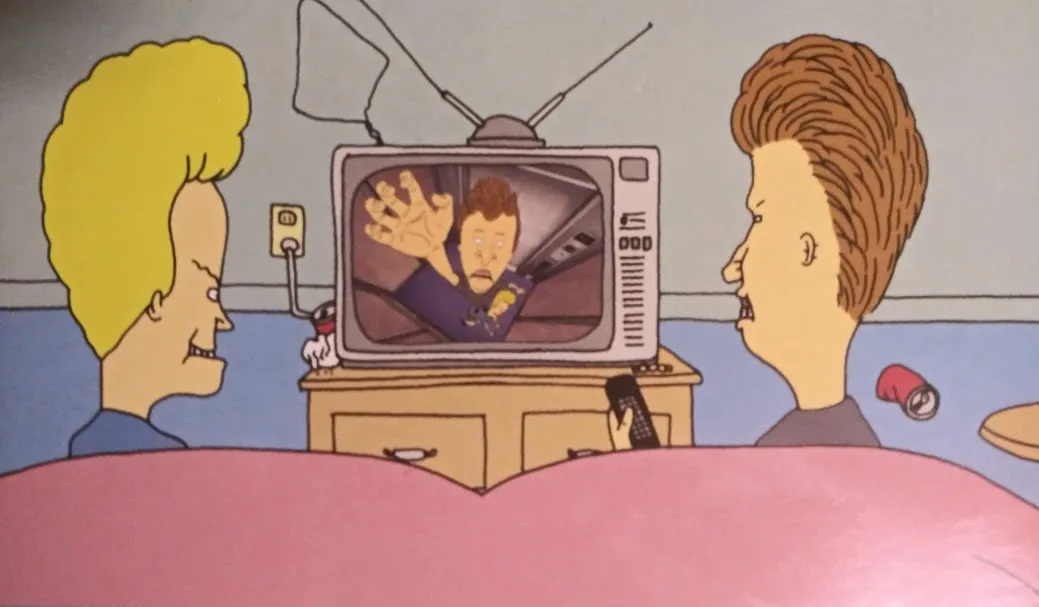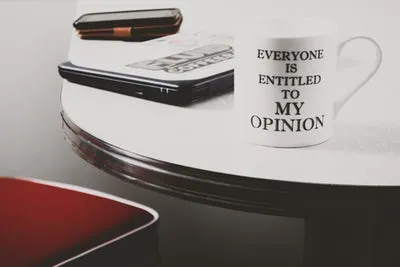
When I was a kid, the scary television show that all the parents were warned about (I am going to "date" myself here) was Beavis and Butthead. "The crude humor and irresponsible actions of these two characters will corrupt the minds of your children" the squares said back in the early 1990's. "You're not allowed to watch that show" my mom told me the first time that she saw it on the screen. I watched it every time that it aired, of course. My parents were too busy with their own activities to stop me and the "taboo" that was placed on it had only motivated me to seek it out even more. I found something of value there, too (though I would not know that until roughly two decades later, as I sat here, rewatching my Mike Judge's Beavis and Butthead Collection DVD set). I noticed that there is an interesting philosophy that seems to guide Beavis and Butthead on their journey through small town life and it is far more "positive" than those outraged parents would have believed. They were too busy being upset about the characters subverting authority and saying (rather tame, by today's standards) "dirty words" to notice there were some "good" lessons to be learned from how those characters lived their lives. That is to say, Beavis and Butthead followed a rather respectable philosophical code of behavior which caused them to be contented, to be effective communicators, it allowed them to find humor in everything, and it drove them to reject the validity of "undeserved" authority. Obviously, these messages were not always apparent on the surface of the show and the medium (a adult comedy cartoon) required certain situations to play out in certain ways that may cloud the philosophical message but it is there and it is valid, in my opinion.
The defining characteristic that Beavis and Butthead share is their constant giggling and that indicates their perpetual contentment. My mom sited their laughing as one of the reasons for disallowing me from watching the show. "They sound like idiots" she said, not understanding that their idiocy is what made the show entertaining. However, upon rewatching the series, as an adult with a somewhat interpretive mind, I saw a deeper meaning in the characters' laughter. They did not simply laugh at things that they thought were funny. They laughed at everything. They laughed as they sat in their filthy foodless house, they laughed as they were beaten, and they laughed as they were humiliated by their teachers. Those are some dark things to chuckle about but it always seemed to express the ease with which Beavis and Butthead are able to find contentment. They don't need a nice house to be happy. They don't need safety to giggle. They don't need respect and recognition to be at peace with themselves. All they really want are some gas station nachos and a few bad 90's music videos to (not surprisingly) laugh at. They seem like people who can be happy with life, regardless of what it throws at them. When we broaden that out, it begins to appear as though it is a rather positive personality trait. If we do not need material comfort or social praise to be happy, we can be happy most of the time.

Some may argue that the laughing is their defense mechanism and there could be truth to that but I would consider it to be a valuable skill for people to cultivate. There are lots of ways that one can deal with the horror that exists in the world and mocking it is one of them. Those of us who possess the ability to do that, have something to fall back on in times of adversity. When we feel like we have reached a breaking point, we can crumble or we can laugh. While some may say that this sort of dark humor is "inappropriate," it provides a greater level of stability to an individual. Beavis and Butthead embody that characteristic to an extreme. They have a lot to be depressed about but they are never depressive. Their ability to laugh allows them to endure the constant hardship that is their lives and that is an ability that few of us have the mental fortitude to possess.
Beavis and Butthead stood on their principals and refused to bow to authorities even in the face of force and that is an admirable quality. I believe that this trait is what made the show particularly offensive to authority figures of the time. "Those boys don't respect their elders" said every angry parent and teacher who saw the series as existing to undermine their authority. Beavis and Butthead did not comply when they were faced by the authorities of their world (their teachers, their boss at "Burger World," and various mall security guards), even when resisting caused them harm (they were weak so they got beat up a lot). Some may say that this aspect of their characters was a result of their stupidity and, in the context of the show, it was but I also see it as an act of being true to their principals. They think that the authority figures are "stupid" and not worth listening to (that is actually true within the context of the show, too). They know that they have no power to protect themselves (that is apparent because they show fear when they encounter a threat) but they choose to disregard the authorities and suffer the consequences anyway. Few real people are willing to act in the same manner as these characters (the outcomes would likely be severe if they did) and that makes Beavis and Butthead's commitment to their worldview a rarity that should be treasured.

Because Beavis and Butthead have no respect for authorities and the rules that they put into place, they allow themselves to be far more honest than a regular person. Rules, customs, and manners are the result of the societal structures that we live under but they can hinder our communication. Is their a nice way to tell someone that they smell bad or that they have a piece of food stuck in their teeth? If there is, it is still uncomfortable for most of us to say. We are left with the choice between staring at the piece of read bell pepper hanging out of a crevice in our coworker's mouth or facing the awkward moment of bringing that thing to that person's attention. Beavis and Butthead do not have that problem. They respect rules and manners as little as they respect the authorities and this frees them. They are brutally honest when they announce that "this sucks" or "that's stupid" without the slightest shame. There is no awkward feeling for them and that makes them highly effective, though somewhat rude, communicators.

While I would not recommend that anyone go out and act like Beavis and Butthead (you will get shot or arrested, if you do), I think that the things that they have to teach us are valuable. We laugh at them because they do silly things and because they are complete idiots but that is only what we see on the surface. The series was always, at its heart, a satire and, that being the case, Mike Judge (the creator, writer, director, and voice actor) provides us with an extreme reflection of reality. Beavis and Butthead are our heroes and they embody positive traits but they are taken so far that they become ridiculous. However, if we dial those aspects of their personalities back, they become characteristics that we could benefit from imitating. Maybe we should be a little more honest. Maybe we shouldn't demand so many prerequisites before we can be happy. We could all benefit from being able to laugh in the face of hardship. I see a deep irony when I look back on the outrage that surrounded this show. Parents worried that their kids would turn out like Beavis and Butthead but they did not understand that there are far worse "role models" for their children to take after.
Peace.
Except for the pictures of my DVD case (which I own), all the images in this post are sourced from the free image website unsplash.com.